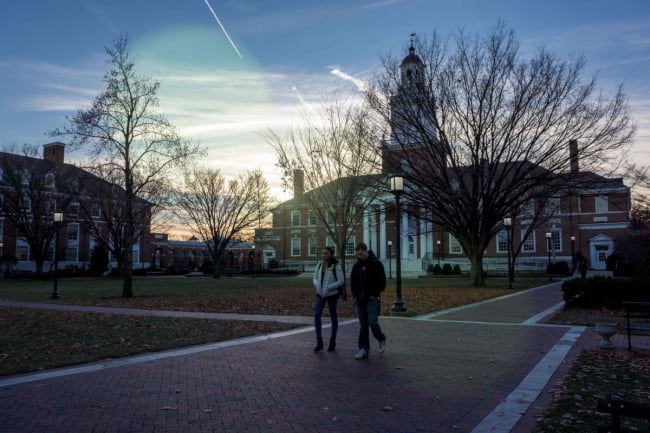You have /5 articles left.
Sign up for a free account or log in.

According to the MOU between the city of Baltimore and Hopkins, the Homewood campus, pictured above, will be patrolled by officers from both departments.
JHU Sheridan Libraries/Gado via Getty Images
After a two-plus-year pause, Johns Hopkins University is moving ahead with plans to establish a private, armed police force. This week it released a draft of its memorandum of understanding with the Baltimore Police Department, laying out the framework for their division of duties.
The two police departments will share the authority to patrol the “campus area,” which includes any buildings owned, operated, leased or controlled by Hopkins within the three Baltimore campuses: the main Homewood campus, the Peabody Institute campus and the medical campus in East Baltimore. The area also includes any public sidewalks, streets, parking areas and thoroughfares immediately adjacent to the campuses.
According to the MOU, released Monday, the Johns Hopkins Police Department will respond to incidents within those regions and the BPD will lead investigations of more serious crimes, such as rape or murder.
Hopkins has invited community members to give feedback on the draft at a series of town hall meetings in the coming weeks. But some opponents of the new police force, including JHU students, university and medical employees, and members of the larger Baltimore community, are objecting to the town halls.
“Some might wonder—why are we are [sic] calling for a shutdown of what appears to be JHU seeking community feedback?” the Coalition Against Police by Hopkins, a collective of over a dozen community and university organizations pushing Hopkins to cancel its policing plans, wrote in a Twitter thread.
“Over the last year+, meeting after draining meeting, Hopkins has failed to adequately respond to or address community concerns,” the thread read. “We refuse to waste our time and energy on those who have no intention of listening. Instead, Hopkins needs to stop its charade of caring about community input. And it needs to put an end to this violent project.”
Opponents worry that the force, which is slated to be made up of about 100 officers, will lead to overpolicing, racial profiling and possibly even police brutality against Hopkins students and employees, as well as members of the surrounding communities.
Hopkins began laying the groundwork to establish its own police force in 2018 but temporarily halted those plans in 2020 amid the nationwide protests against police brutality following the murder of George Floyd by Minneapolis police. Hopkins officials said they planned to use the break to allow legislators to pass statewide police reforms, as well as to update their existing campus safety measures and improve the university’s partnership with the city.
Protesters argued that the institution should do away with its plans for a police force altogether, rather than simply take a break.
Now the MOU has ignited new worries.
Jayla Scott, president of Hopkins’s Black Student Union, expressed concern about the police force’s close partnership with BPD because of the city department’s reputation for corruption and impropriety.
“The MOU also reveals that BPD will still heavily be involved in processes on campus including crime scene processing, evidence storage” and taking the lead on major crimes, she told Inside Higher Ed in an email. “If JHPD is suppose(d) to be this superior police force that is setting the standard for police accountability across the country, how can they do that while heavily being involved with one of the most corrupt police forces in the nation(?)”
The Baltimore department was home to the Gun Trace Task Force, a group of officers who were found to have who used their authority to steal drugs and money, among other crimes. After an African American man named Freddie Gray died in Baltimore police custody in 2015, six cops were charged but none were convicted. Officers within the department have been convicted of assault, reckless endangerment, falsifying records and more.
A spokeswoman for the BPD, Lindsey Eldridge, declined to comment on Hopkins community members’ concerns about the partnership between BPD and JHPD, stating that inquiries about the MOU should be directed to Hopkins.
Dr. Zackary Berger, a Hopkins physician and associate professor, noted that allowing JHPD to patrol surrounding streets and sidewalks is “pretty astonishing, considering multiple neighborhood associations, at least three, voted against Hopkins police.” Community associations representing Harwood, Abell and Remington, all located near the Hopkins Homewood campus, each voted internally to oppose the formation of the police department back in 2019, when the Maryland General Assembly was considering the Community Safety and Strengthening Act, the bill that allowed Hopkins to have a private police force.
Beyond the content of the agreement, some JHPD opponents have complained that the MOU was released too quickly for community members to read it ahead of the first feedback session, slated for tonight. They also noted that locating two out of the three town halls on Hopkins campuses makes it more difficult for community members to take part; the third will be virtual.
Hopkins spokesperson Megan Christin pointed out that according to the Community Safety and Strengthening Act, public forums need to be on or near either Hopkins’s Homewood campus or the East Baltimore campus. She also said the MOU was published as early as possible.
“This process has been going on for years,” Dr. Berger said. “Hopkins engineers very closed and stage-managed town halls and does not execute any changes based on these town halls.”
Branville Bard Jr., Hopkins’s vice president for public safety, who will oversee the JHPD, disagreed that the institution has failed to consider community members’ feedback in the past.
“I can speak to my levels of engagement,” he said. “Since I’ve been here, during the year, I’ve been in hundreds of meetings with all of our stakeholders, whether it be staff, the students, the neighborhood association, so I’ve done a lot by way of listening and learning from the community and taking what they said and trying to use it to incorporate it into the eventual JHPD and to impact and improve public safety over all at Johns Hopkins.”
The institution already employs about 1,000 unarmed security personnel.
The town halls will be narrowly focused on the MOU, whose final draft Bard said he expects to be significantly influenced by the input sessions and a feedback form available online.
Still, many critics—including Natalie Wang, a JHU junior studying neuroscience and medicine, science and the humanities—believe that by launching the police department after more than two years, Hopkins is ignoring feedback and trying to minimize students’ voices.
Before the pandemic, in 2019, students staged a long-term occupation of a campus administration building, Garland Hall, to protest the creation of a campus police force. But many of those students have moved on.
“Basically, Hopkins waited for those people to graduate,” Wang said.





